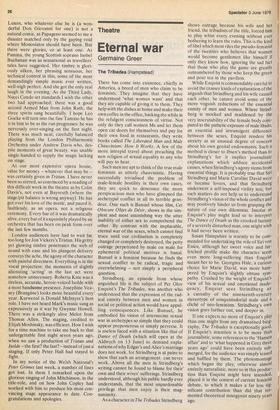Theatre
Eternal war
Germaine Greer
The Tribades (Hampstead)
There has come into existence, chiefly in America, a breed of men who claim to be feminists. They imagine that they have understood 'what women want' and that they are capable of giving it to them. They help with the dishes at home and make their own coffee in the office, basking the while in the refulgent consciousness of virtue. Not only do they call women Ms and let them open car doors for themselves and pay foi their own food in restaurants, they write books called The Liberated Man and Male Chauvinism: How It Works. A few of the more intrepid travel about preaching the new religion of sexual equality to any who will pay to hear.
Such men are apt to think of the true male feminists as utterly chauvinistic. Having successfully trivialised the problem of male-female hostility in their own cases, they are quick to denounce the more perspicacious men who have glimpsed the archetypal conflict in all its terrible grandeur. One such is Bunuel' whose film, Cet Obscure Objet de Desir, shows in the simplest and most astonishing way the utter inability of either sex to comprehend the other. By contrast with the implacable, eternal war of the sexes, which cannot find truce until our civilisation is completely changed or completely destroyed, the petty outrage perpetrated by male on male for ephemeral political motives is banal. Bunuel is a feminist because he finds the sexual conflict to be radical, tragic and overwhelming not simply a peripheral question.
Strindberg, an episode from whose anguished life is the subject of Per Olov Enquist's The Tribades, was another who understood that the expression of the radical enmity between men and women in social or political action would have appalling consequences. Like Bunuel, he embodied his vision of internecine sexual war in archetypes so simple that they could appear preposterous or simply perverse. It is useless faced with a situation like that of Dance of Death (which will open at the Aldwych on 13 June) to demand explanations of why Edgar's and Alice's marriage does not work, for Strindberg is at pains to show that such an arrangement can never work. Above all the men in Strindberg's writing cannot be found to blame for their' own and their wives' sufferings. Strindberg understood, although his public hardly ever understands, that the most unpardonable privilege that men enjoy is their mag nanimity. .
As a character in The Tribades Strindberg shows outrage because his wife and her friend, the tribadists of the title, forced him to play whist every evening without ever bothering to learn the rules. This is the kind of libel which most riles the pseudo-feminist of the twenties who believes that women would become gentlemen like himself if only they know how, ignoring the sad fact that those who play the game are greatly outnumbered by those who keep the green and pour tea in the pavilion.
While Enquist is commendably careful to avoid the crasser kinds of explanation of the anguish that Strindberg and his wife caused each other, he cannot avoid some of the more voguish reductions of the essential enmity of men and women. Where Strind
berg is mocked and maddened by the very inscrutability of the female body cdm
pared to the pathetic exposure of male libido, an essential and intransigent difference between the sexes, Enquist renders his anxiety as an unusual degree of concern
about his own genital endowments. Such a method is closer to Ibsen's method than to
Strindberg's for it implies journalistic explanations which adduce accidental causes, when Strindberg's agony stems from essential things. It is probably true that Sill Strindberg and Marie Caroline David were or became lovers, and that Strindberg underwent a self-imposed virility test, but such matters do not help us to understand Strindberg's vision of the whole conflict and may positively hinder us from grasping the nature of our own dilemmas. Insofar as Enquist's play might lead us to interpret The Dance of Death as the crooked fantasY of a severely disturbed man, one might wish it had never been written.
Susan Hampshire is warmly to be commended for undertaking the role of Sin i von Essen, although her sweet voice and far fetched profile make the character seem even more long-suffering than Enquist meant her to be. Georgina Hale, a curious choice for Marie David, was more hampered by Enquist's slightly obtuse sym pathy. Crushed by the weight of Enquist's view of his sexual and emotional inadequacy, Enquist sees Strindberg as a casualty of the nineteenth-century stereotype of conquistadorial male and cliché of neo-feminism. Strindberg's own vision goes further out, and deeper in.
If one expects no more of Enquist's play than one might from any dramatised biography, The Tribades is exceptionally good. If Enquist's intention is to be more than journalistic, some references to the 'Hansen affair' and to 'what happened in Grez three years ago' could have been entirely submerged, for the audience was simply teased and baffled by them. The photomontage which began the play, otherwise almost entirely naturalistic, more so in this production than Enquist might have intended, placed it in the context of current feminist debate, to which it makes a far less significant contribution than did that tormented theoretical misogynist ninety years ago.


































 Previous page
Previous page